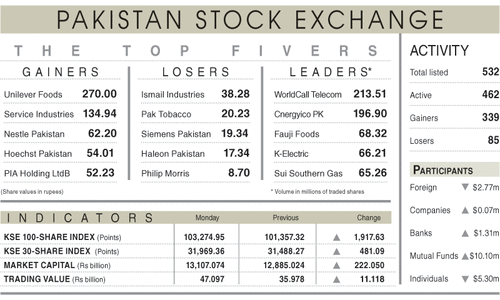 A STEEP decline in prices of some varieties of Basmati highlighted the trading on the Karachi wholesale commodity markets last week followed by active selling by local stockists amid market talks of steady arrivals of new crop from upcountry trading centres.
A STEEP decline in prices of some varieties of Basmati highlighted the trading on the Karachi wholesale commodity markets last week followed by active selling by local stockists amid market talks of steady arrivals of new crop from upcountry trading centres.
Coarse Basmati varieties led the market reversal, falling by Rs700-1,000 per bag after several weeks of sustained run-up to new all-time high levels attained by fine type Basmati including kernel types, which are still ruling at higher levels, dealers said.
All coarse varieties Basmati were marked sharply down from their current career-best level by Rs700-800 per bag of 100 kg, they said adding “indications are there that they may fell further below as they are still ruling at fairly higher levels”.
Barring IRRI-6, which also followed the lead of Basmati, all other varieties were traded at the last levels partly because of a considerable decline in the ready demand, they said.
The new crop arrivals of IRRI varieties both from the Sindh and the Punjab cotton belts where harvesting has just started, are expected to take prices further down from the current higher levels, market sources said.
They said reports of another bumper crop of around 5.6m tones is expected to push price of both fine and IRRI types down during the next couple of months irrespective of deeper inroads being made by private sector exporters.
Meanwhile, the government has done away with the condition of minimum export price, which exporters said could give them a free hand to sell the exportable surplus well in time.
Of the local total production after meeting the local demand, about three million tones will be available for export during the current year, but it is too early to speculate about the impact of export on the local price line, analysts said.
Among other essentials, sharp rise after last couple of weeks’ stable price outlook in wheat prices was not backed by another valid reason as there is no pressure on ready supplies.
An import of half million tones of wheat to supplement the local supplies including a ship with 34,442 tons of the commodity is in the port offloading the commodity, but prices kept rising owing to crisis on the flour front, dealers said.
They said speculative trading in wheat on the wholesale market was one of the reasons, which is keeping prices higher despite the fact that the indigenous wheat is said to be cheaper in the interior owing to larger imports.
Wheat prices soared to an all-time peak level of Rs2,465 per bag, up by Rs150, an unprecedented rise in a single week despite higher imports and steady arrivals from upcountry markets.
But other essential items generally fell under the lead of Basmati varieties, which suffered fall ranging between Rs700- 1,000 per bag, but are still ruling higher as compared to previous year’s rates.
IRRI types were also marked down by Rs100 per maund but kernel and sela types did not show any change because of Ramazan buying support.
Pulses sector remained relatively calm as most of the imported types, notably masoor and urad, were traded at the last levels but beetle and gram whole remained under pressure and were marked down by Rs200 per bag.
After an initial fall, sugar prices maintained their previous levels but ready off-take was said to be on the higher side at the unchanged rates. Desi sugar followed it but gur was quoted lower by Rs100 per 40 kg amid falling demand.
Cereal sector showed firm trend as barring bajra ,which ran into profit-selling at the higher levels, all others including maize, which was marked down by Rs75. Jowar, after remaining static for the last couple of week, rose sharply higher by Rs200 to Rs275 per maund on reports of short supply and larger exports.
Barley followed them amid reports of slow arrivals from upcountry markets and higher exports. Its prices were quoted higher by Rs50 per 100 kg.
Guar seeds also followed the general market trend but reports of short supply owing to a considerable fall in arrivals from upcountry markets, pushed its prices higher by Rs75.
Among major oilseeds, til prices fell sharply lower by Rs700 per 40 kg partly on local selling and partly to reports of fall in world demand. Castor seed followed it but managed to finish unchanged.
Oilseed sector again showed dull conditions as prices of all major seeds notably rap seed were held unchanged but cottonseed, on the other hand after early decline, rose by Rs15-50 on reports of pressure on local supplies.
Cotton also followed them as prices fell by Rs100 per maund on selling by ginners followed by reports of steady arrivals of phutti into the ginneries.
Oilcakes ruled easy amid falling demand and as a result, prices of both rapeseed and cottonseed cakes were marked down by Rs10-30 on dealer selling.—M.A.













































Dear visitor, the comments section is undergoing an overhaul and will return soon.